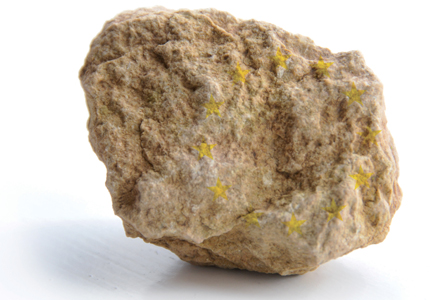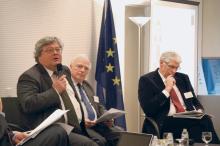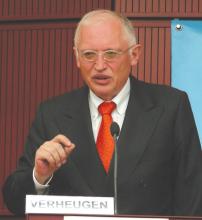
The European commission has recently published a number of documents that will affect the aggregates sector. The European Aggregates Association (UEPG) summarises the key events.
European politics covers a wide range of issues but the minerals industry has been in the spotlight in several recent publications and communications. But while some of these announcements mark key milestones in lobbying the
According to the UEPG, not all of the focus has been in the right areas and this dilution could impact on the success of initiatives for the aggregates sector.
In the framework of the Europe 2020 Strategy, the European Union launched seven flagship initiatives and three of them are of interest to the aggregates industry. The first is the innovation union, with its potential partnership with 'Raw Materials for a Modern Society', its Green Paper 'Towards a common strategic framework for EU research and innovation funding'. The other initiatives are the Resource Efficient Europe initiative and the one on Industrial Policy with its new strategy on raw materials.
Materials Supply
The
The Communication was expected to be published by the Commission on 26 January. Being postponed already from December last year, the Commission had been asked to further delay publication. The reason for this was the urgent request of an EU Member State to include commodity markets for oil, gas, electricity, agriculture and food security. The UEPG believes that this has diluted the focus on raw materials and specifi cally on aggregates.
In the new Communication, the three pillars of the 2008 Raw Materials Initiative are now preceded by 10 pages addressing commodity markets. The actual Raw Materials Initiative starts on page 11 (point 4) providing fi rst a review of the achievements of the last two years. The second pillar of the Initiative on 'fostering sustainable supply within the EU' is placed on page 17/18 before the Communication ends with the way forward on page 20.
Resources
On 26 January 2011, the European Commission published a new Communication on 'Resourceeffi cient Europe'. Actions under the resource-effi cient Europe fl agship have close links to other fl agship initiatives under the Europe 2020 strategy, in particular those on industrial policy and the innovation union.
This fl agship initiative aims to create a framework for policies to support the shift towards a resource-effi cient and low-carbon economy with the objective to: boost economic performance while reducing resource use; identify and create new opportunities for economic growth and greater innovation and boost the EU's competitiveness; ensure security of supply of essential resources; and fi ght against climate change and limit the environmental impacts of resource use.
The Communication gives examples of synergies: one example being to increase recycling rates, which would reduce the pressure on demand for primary raw materials, help to reuse valuable materials which would otherwise be wasted, and reduce energy consumption and greenhouse gas emissions from extraction and processing.
Annex 1 of the Communication sets initiatives foreseen in 2011 to deliver on the resource-effi cient Europe fl agship, which include the Communication on a 2020 EU biodiversity policy and strategy, planned for the fi rst quarter of 2011 and the Communication tackling the challenges in commodity markets and on raw materials, which was published on 2 February 2011.
The
The debate will consider the three key areas for the industry: resource effi ciency; fostering sustainable supply within the EU; and promoting recycling. The event will bring together industry leaders and Members of the European Parliament to exchange views on these important issues.









